As people who love and care about tea we believe that we have a responsibility to support a higher standard of living and a sustainable future for the people who bring us these fantastic products. For this reason, Arbor Teas is committed to offering one of the widest selections of Fair Trade Certified® loose leaf teas available, and we celebrate the Fair Trade Certified® Communities from which they originate.
Fair Trade Certified tea comes from both cooperatives and from large farms. Fair Trade helps tea farmers and workers gain access to capital, set fair prices for their products, and make democratic decisions about how to best improve their business, their community and their tea. The best tea gardens and cooperatives understand that high-quality specialty teas depend on the people and the environment that produce them.
Fair Trade provides many opportunities, programs and benefits for the communities and people it supports, including:
- Ensuring wages that meet or exceed established minimums
- Ensuring that farmers make a fair price for their product that meets or is above the standard price
- Adherence to national and international labor protections, ensuring that there is no child labor or forced labor
- Freedom of association and organization
- Safe working conditions
- Fosters environmental responsibility, including worker protection from exposure to harmful agrochemicals
- Fair Trade premiums are invested back into communities in the form of schools, scholarships, health and housing improvement, and more
How Fair Trade Works
Fair Trade is rapidly becoming an important part of the economy, and with that comes a desire for transparency. Fair Trade is a complicated organization, and not without criticism. As a result, it is often confusing for consumers and companies alike. The following are a few key points to understand how Fair Trade works.
-
Two primary organizations are responsible for operating the Fair Trade program in the USA. The first, Fairtrade Labelling Organizations International (FLO), provides the international oversight for Fair Trade efforts across the globe. FLO is responsible for establishing the internationally-recognized Fair Trade standards, and then certifying those producers who operate in accordance with them. The second is TransFair USA, TransFair (or Fair Trade USA) is primarily responsible for tracking the purchase and sale (within the United States) of products made by Fair Trade Certified producers abroad. They are the sole organization in the USA that licenses wholesalers and retailers to legitimately use the Fair Trade logo (one of 20 member-organizations of FLO around the world).
-
The primary components of FLO’s Fair Trade standards are (excerpted from TransFair’s website):
- Fair price: Democratically organized farmer groups receive a guaranteed minimum floor price and an additional premium for certified organic products. Farmer organizations are also eligible for pre-harvest credit.
- Fair labor conditions: Workers on Fair Trade farms enjoy freedom of association, safe working conditions, and living wages. Forced child labor is strictly prohibited.
- Direct trade: With Fair Trade, importers purchase from Fair Trade producer groups as directly as possible, eliminating unnecessary middlemen and empowering farmers to develop the business capacity necessary to compete in the global marketplace.
- Democratic and transparent organizations: Fair Trade farmers and farm workers decide democratically how to invest Fair Trade revenues.
- Community development: Fair Trade farmers and farm workers invest Fair Trade premiums in social and business development projects like scholarship programs, quality improvement trainings, and organic certification.
- Environmental sustainability: Harmful agrochemicals are discouraged in favor of environmentally sustainable farming methods that protect farmers’ health and preserve valuable ecosystems for future generations.
-
Fair Trade Certified producers benefit from the Fair Trade program by receiving a premium that is assessed on every pound of Fair Trade Certified product purchased by importers/resellers. This money goes directly back to the producers, who democratically decide how it is to be invested in social welfare programs (healthcare, education, infrastructure, etc.) benefiting their community.
-
On the international side, FLO inspects Fair Trade producers on an annual basis, not only to check work conditions, wages, use of Fair Trade premiums and the like, but also to make sure they have a viable plan for selling their product.
-
On the domestic side, TransFair performs quarterly audits of all companies licensed to sell Fair Trade Certified products. These audits ensure that the quantities of Fair Trade imports into the USA are properly accounted for through the whole supply chain. In doing so, they aim to prevent the fraudulent sale of non-Fair Trade products as “Fair Trade,” and to make certain that producers receive all Fair Trade premiums that they are due.
If this seems like a lot of red tape just to bring socially-responsible goods to market, you’re right. It’s not easy, particularly in a global economy such as international agriculture, and that’s one of Fair Trade’s biggest criticisms as well as achievements. But, there is no other independently audited program (at the moment) that can fairly and accurately account for goods produced in a socially-responsible way all the way from the field or factory to a shopping cart half-way around the world.
Why Aren’t All of Our Teas Fair Trade Certified?
One reason all of our teas are not Fair Trade Certified is that the Fair Trade movement in the tea industry is still growing, and many authentic varieties remain unavailable in a Fair Trade Certified® form. However, we search constantly for new Fair Trade Certified® products that meet our standards, and will add them to our inventory as they become available. Additionally, because Fair Trade focuses on the developing world, teas from places like Japan (where fair market and labor conditions already prevail) will not be found under the Fair Trade Certified® label. If you find a Japanese-style tea bearing the Fair Trade Certified® logo, it has most likely been grown somewhere else.
Our Fair Trade Communities
We receive our tea and herbs from many Fair Trade Certified gardens around the world. Read on to learn about several of them!
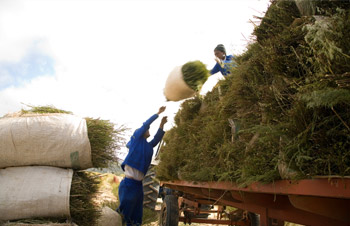
The Rooibos-producing farm Driefontein (“three fountains”) is located near the small town of Redelinghuys some 200 km to the north of Cape Town. Originally, it belonged to a commercial farmer who pursued Fair Trade Certification as a way to empower his 36 permanently employed workers. In March 2010, the 110 hectare Driefontein farm was put into a trust and the 36 farm laborers formed a legal cooperative as the Driefontein Small Farmers’ Cooperative. Their enthusiasm and relationship with Rooibos Ltd have resulted in the excellent production of organic Rooibos in a sustainable way to better the lives of these workers and their families.
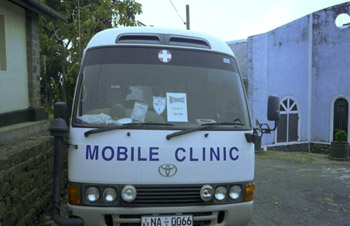
Nestled among the hills on the southern edge of the Uva Highlands of Sri Lanka, the Greenfield Estate is part of the Greenfield Bio Plantations which includes the Greenfield and Thotulagala Estates. At an altitude of 5000-6000 ft where the climate is cool and the air beautifully clear, the Greenfield tea factory is surrounded by roses and jasmine -- their fragrance backed by the heady aroma of newly processed tea. On clear days the coast shimmers in the far distance.
Fair Trade certified in 2003, the Greenfield Estate used its premiums to construct a new cultural center where social functions, weekly meetings, clubs, and classes are held. They have also re-painted homes and, by popular vote, provided each home with a lockable wardrobe for storing valued possessions away from moths and humidity. Additionally, they have provided English language lessons for young people on the estate and purchased extra schoolbooks.
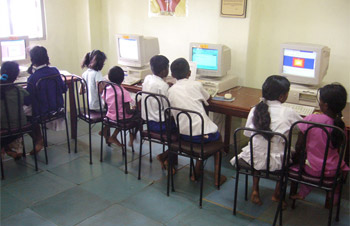
The Idulgashinna Estate is part of the Stassen Bio Estate collective. In 2014, the Stassen Bio Estate was recognized at the Fairtrade Awards as the top hired labour organization in the Asia Pacific region. Fair Trade premiums are frequently invested in education by the workers of Idulgashinna, but the integration of the Fair Trade system in 1992 has also had a large impact on the estate.
Prior to Fair Trade’s involvement, Rajaratnam Gnanasekeran, manager of one of the Stassen Estates and Chairman of Sri Lanka’s Fair Trade producer association, described an environment where the workers operated under both fear and obligation. Their voice remained largely unheard, resulting in a disconnect between the needs of the workers and the management’s objectives.
The rights of the workers were not the only challenge that Stassen Bio Estate faced, another was accessible education. Education is a right of every Sri Lanka citizen, however the nearest school for the Stassen Bio Estate was several kilometers away. This made it extremely difficult to access, and almost impossible for the younger children, as it would involve a long, walk on rough roads.
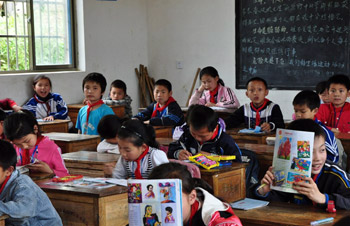
Situated in the Wuyuan Mountains of China in the Jiangxi region, the Da Zhang Shan Tea Garden maintains the region’s 1,200-year reputation as the “golden triangle” of exceptional tea production. The farmers of Da Zhang Shan are traditional tea cultivators and have never used chemical fertilizers or pesticides on their property, which made it easy to achieve organic certification in 1997. The cooperative is dedicated to expanding its membership, improving working conditions and economic efficiency, and spreading the word about organic agriculture and environmental sustainability.
In 2001, the Da Zhang Shan Organic Tea Farmer Association became the first producer organization in China to gain Fair Trade certification. The group has more than 5,400 member households; moreover, the proportion of women members has increased dramatically since its inception. Today, women make up almost 35 percent of the membership. The association extends membership not only to farmers but also to the technicians and tea processors who handle the teas and prepare them for sale to buyers.
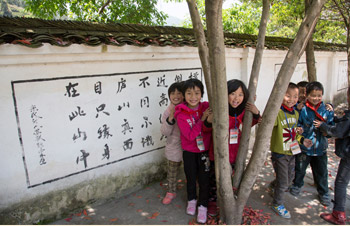
Jiangxi WuYuan Xitou Tea Farmer’s Association in China’s Jiangxi province reflects the transition of a society from governmental control to democratic processes and market economy.
WuYuan Xitou was registered with Fair Trade in 2004. Since then, the Fair Trade system, standards and process has helped the WuYuan Xitou tea farmers in their progress toward the democratization of their local economy and government. Once state-owned, WuYuan Xitou’s 10 tea gardens are now owned by individual farmers who have collectively assembled to make up the farmers association. Three of the tea gardens are collectively owned but individually managed. For example, one garden belongs to the area’s middle school and is rented to a single tea farmer who manages it independently.
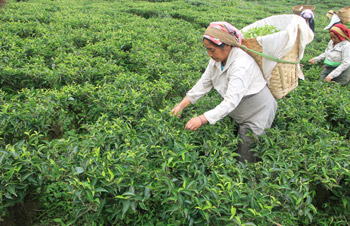
"We give our tea plantation constant and natural assistance with biodynamic techniques. One look at our land, even to the unschooled eye, will show a forest teeming with wildlife and plant life, a bounty of the sky with butterflies and birds, and all these synergistic life forces show up in the cup." -- Rajah Banerjee, Makaibari owner and manager.
The Makaibari tea garden lies in the Darjeeling hills of northeastern India. In continuous operation since 1859, Makaibari is one of the oldest of all Indian tea gardens, and home to 610 tea workers and their families.
Located in Yunnan, China, the villages of Mannong and Manmai are nestled in one of the oldest tea cultivation zones in the world on the Hekai Tea Mountain, in the northern section of the famous Nannuo mountain chain in Xishuangbanna. The area's pristine natural environment and rich biodiversity make it a truly special place for tea, and the mild, moist climate provides excellent growing conditions.
In 2005, the wild-tea pickers of Nam Lanh in north Vietnam in the region on Yen Bai became Fair Trade certified through association with the Nam Khat Cooperative. The ancestors of the villagers have been populating the northern mountains of Vietnam for thousands of years. Though Vietnam shows signs of modernization in most places, the village manages to preserve its lifestyle and customs. Men and women dress in the traditional black clothing of their ethnic Dzao group. Mostly subsistence farmers, traditionally making a living from growing rice, herbs and rearing chickens, their goal with their Fair Trade premiums is to increase income enough to support them in their efforts to stay on their land and in their villages, maintaining their traditional lifestyles.
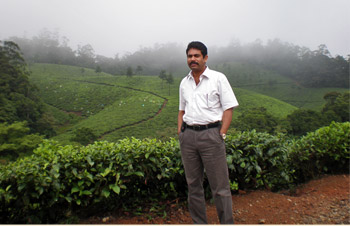
Oothu Singampatti Estates is one of several holdings of the Bombay Burmah Trading Corporation Ltd. (BBTC). The Oothu Singampatti Tea Estate was started in 1929 as a new plantation in the Manjolai Manimuttar hills in the eastern mountain region of southern India. In 1965, the Singampatti Group was founded to manage this estate. This group has three distinct operations, but Oothu Singampatti is particularly interesting as it was the first of the three tea gardens to adopt biodynamic principles and the first in the country to become certified organic.
Oothu is situated among the tropical evergreen forests of the Kalakkad and Mundanthurai Tiger Reserve. These forests are some of the best preserved in the world and are home to a wide variety of plants and animals. The local communities have been able to preserve the native flora and fauna extraordinarily well over the years. Oothu Singampatti practices 100% organic tea cultivation and production, and parts of the other gardens—Manjolai and Manimuttar—are fully organic certified. The organization has always strived to achieve the most sustainable agricultural practices. This history of integrated sustainability made the organization an easy fit for Fair Trade when the group gained certification in 1995.
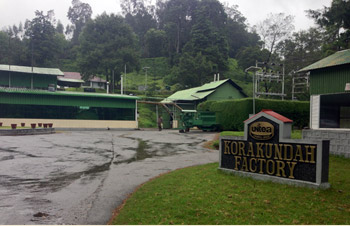
The United Nilgiri Tea Estates Co. Ltd. (UNTE) is located in the Nilgiri Hills of Tamil Nadu in the southern cone of South India. The group is comprised of four neighboring tea estates: Chamraj, Korakundah, Allada Valley, and Devabetta. The tea gardens are set among rolling hills covered in dense vegetation and natural forest interspersed with small villages at elevations above 6,500 feet, which enables the production of black, green, and oolong orthodox teas of distinctive quality. At 10,000 feet, Korakundah is the highest tea estate in India. Historically, the living and working conditions of the laborers on remote tea plantations, such as Chamraj, have been notoriously poor. In 1951, the Plantation Labour Act was one of the first attempts to make estate companies responsible for the welfare of their workforce, including the provision of housing, healthcare and education.
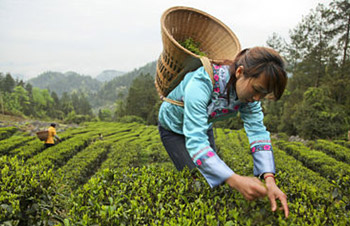
Located in Enshi Tujia ethnic region with the Qingjiang River connecting the upper reaches of Yangtze River in Southwestern Hubei, Central China, Xuan En is well-known for its unique tribute teas as well as its superior organic and fair-trade teas. The Xuan En Yisheng Tea Co-Op, Certified Organic in 2006 and Fair Trade in 2007, was established to help local farmers develop economic stability. There are currently over 1200 members.
Information assembled from and provided by Fairtrade International, Fair Trade USA, and individual producer publications.


